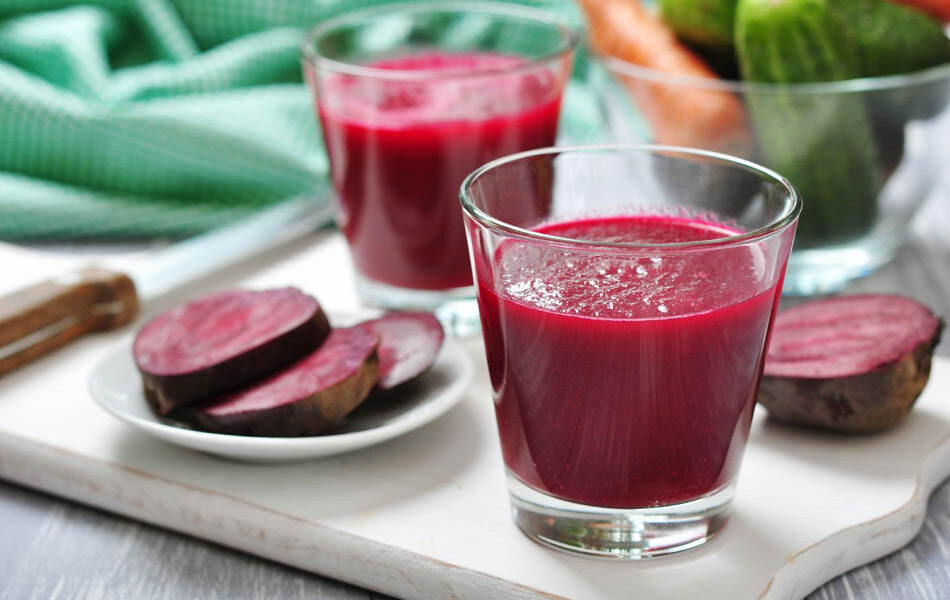Is Beet Juice Good for Diabetes? Learn Its 4 Benefits
Beet juice can help decrease inflammation in the body thanks to its high antioxidant capacity. However, can people with diabetes drink it without spiking their sugar levels? Our experts explain.

Beets are known for being a powerhouse food. That is why more and more people are adding beetroot juice to their diets.
Beets have an earthy and sweet taste, and their high antioxidant capacity can help reduce oxidative stress, reducing inflammation. While you can have them raw or cooked, juice is often the preferred option.
However, due to its high sugar content, there is a concern about whether or not people with diabetes can drink beet juice.
Here, you will learn whether you can include beetroot juice if you have diabetes and how to prevent it from affecting your blood sugar.
Is Beet Juice Good for Diabetes?
Beet juice is good for people with diabetes if consumed in moderation. It is packed with antioxidants and provides essential nutrients like folate, potassium, and manganese.
However, the problem with beet juice arises from its high sugar content, especially when cooked. The juice has 4.8g of net carbs per 100g, and while this doesn’t sound like a lot, it can have a massive impact on blood glucose.
Still, people with diabetes can benefit from the nutritional properties of drinking beetroot juice. It has fiber that can help fight constipation and control blood glucose levels. Also, thanks to its nitrate content, beet juice can help lower blood pressure.
However, the better option is celery juice or green smoothies, where the main ingredients are green vegetables and leafy greens.
Beet Juice Nutritional Value per 100g
Beetroot juice is high in nutrients like folate, manganese, potassium, and vitamin C.
Plus, eating beets can provide you with several antioxidants like rutin, epicatechin, and caffeic acid. All of which can help reduce inflammation in the body.
In the following table, you can find the nutritional information of beetroot juice per 100g.
| Net Carbs | Total Carbs | Fats | Protein |
| 4.81g | 5.91g | 0.06g | 0.72g |
| Calories | Fiber | Sugars | Glycemic Index |
| 25 | 1.1g | 4.84g | 64 |
Glycemic Index of Beet Juice
Beetroot juice has a glycemic index (GI) of 64. This means that it is in the category of medium GI. Those foods with a medium glycemic index have a slower glucose release than those on the high GI list. An example of high GI food is watermelon – its GI is 80.
The good news is that you can consume beet juice if you have diabetes, but make sure you do it in moderation.
How Does Beet Juice Affect Blood Sugar?
Beetroot juice is high in sucrose, and it can elevate your blood sugar levels when consumed in large quantities. Therefore, you should consume beet juice after meals and only in moderation.
People with diabetes have insulin resistance. Insulin is a hormone released by the pancreas that removes the glucose in your blood flow and stores it in your cells. When the insulin is not working properly, the glucose cannot enter the cells. In the end, this leads to more glucose available in your blood (hyperglycemia).
Is beetroot juice high in sugar?
Yes, beetroot juice is high in sugar. One cup of beetroot juice (8oz) has 12.1g of sugar. This represents consuming 3 teaspoons of sugar, which might cause a slight spike in sugar levels for those with prediabetes or diabetes.
How to Drink Beet Juice for Diabetes
If you want to get the health benefits beetroot juice offers without affecting your sugar levels, there are several things you can do to lower the glucose impact.
You can add foods that can reduce the glycemic response. Foods like peanuts, salmon, and okra take longer to digest in the stomach, leading to a lower glucose release.
You can also take apple cider vinegar before having beetroot juice. Apple cider vinegar might help improve insulin sensitivity, leading to more stable blood sugar levels.
How much beet juice should a person with diabetes drink?
To prevent high carbohydrate ingestion, consume less than one cup (8oz) of beet juice daily. According to the ADA, one serving of carbs is 15 grams, so keeping it close to this is best for blood sugar management.
The recommendations might vary if you take insulin or any other medication. If this is the case, consult your doctor about the best portion size for you.
4 Benefits of Beet Juice for Diabetes
Thanks to its high nutrient profile, beet juice offers several health benefits.
Here are the 4 main benefits of drinking beet juice if you have diabetes.
#1 Helps to reduce blood pressure
Research shows that drinking beet juice can help decrease blood pressure. Nitrates help produce nitric oxide, which can help relax blood vessels, making them go wider. In the end, this leads to lower blood pressure.
In a study, people who took one glass (8oz) for 4 weeks had a reduction of 8 points in their blood pressure. It also showed a 20% increase in their blood vessel elasticity.
#2 Great for eyesight
Beet juice is high in antioxidants like lutein and zeaxanthin, which can help protect you from UV light. So, consuming foods high in these components can help improve eye health.
Lutein and zeaxanthin also help with:
- Cataracts
- Diabetic retinopathy
- Age-macular degeneration
- Retinal detachment
#3 Improves liver function
Being high in antioxidants and having some small levels of vitamin A, iron, and vitamin B6, beet juice can help improve your liver function. All these components might decrease oxidative stress in the body, leading to better liver function. This improvement was seen in several studies.
#4 Relieves skin problems
Beets are high in vitamin C, and this antioxidant can help promote good skin. Vitamin C is believed to boost the production of collagen, a protein that makes up over 70% of the skin.
As a result, consuming beet juice with a collagen supplement can help you have better-looking skin.
A Word From a Nutritionist
Beet juice is packed with nutrients and antioxidants that can provide several health benefits for someone with diabetes.
They can help you have low blood pressure, improve eyesight, boost liver function, and relieve skin problems.
Cooked beets tend to have higher sugar content than raw beets. So, if you want lower blood sugar, make sure to consume more raw beets over cooked ones.
You can also have lower blood sugar levels when you drink beet juice, along with chia seeds, protein powder, and carrots. All of these can help prevent your glucose levels from spiking.
Conclusion
Beet juice is an excellent source of nutrients and antioxidants. While it has high sugar content, if you are careful with the portion size, you can include it if you have diabetes. Adding low-GI foods like protein, non-starchy vegetables, and fats can help reduce the glucose response, so it is best to drink beetroot juice after your meal.
Make sure to measure the portion size to get all the benefits of beet juice, like sustained blood pressure lowering, great eyesight, improved liver function, and relieving skin problems without affecting your blood sugar levels.

















































 Select your language:
Select your language: 









